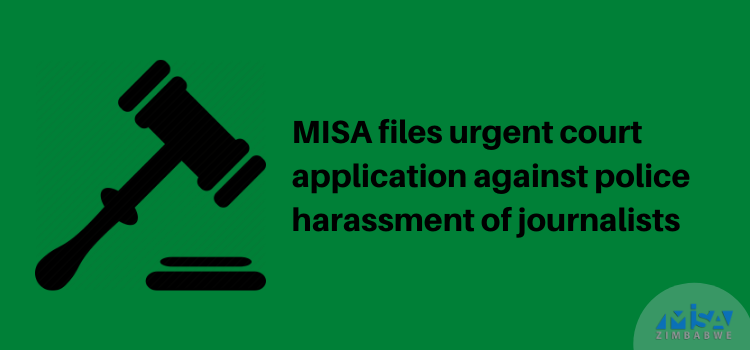MISA Zimbabwe has filed an urgent chamber application with the High Court seeking an order interdicting police officers and other law enforcement agents responsible for implementing the COVID-19 lockdown from interfering with the work of journalists on the basis that their press cards were issued in 2019.
In the application filed by lawyer Chris Mhike, MISA Zimbabwe is the first applicant while journalist Panashe Makufa is the second applicant. Police Commissioner-General Godwin Matanga and the Zimbabwe Media Commission (ZMC), are cited as first and second respondents, respectively.
According to the applicants, any and all acts of interference with the journalistic work of the second applicant (Makufa), and members of the first applicant (MISA Zimbabwe), without due process or on account of the status of their accreditation during the current lockdown is a violation of the right to freedom of expression and freedom of the media as enshrined in Sections 61 and 62 of the Constitution.
The respondents should also be ordered to ensure that the ZMC’s statement about the validity of the 2019 press cards is communicated to all police stations in Zimbabwe.
The statement should also be issued to all “appropriate commanding officers” of any agents who might be assisting the Zimbabwe Republic Police in enforcing the law within 12 hours after handing down of the order being sought.
In addition, the respondents should also be ordered to take “all necessary measures” for the protection of the media. They should also disclose “precisely” how they are going to shield MISA Zimbabwe’s members and other media personnel, from harassment during the lockdown.
Meanwhile, the applicants contend that the respondents’ interventions and efforts to protect journalists during the COVID-19 lockdown from “the hazards in the field” have not been adequate, thereby necessitating additional safeguards from the courts.
“If the court does not intervene at this stage of the lockdown, for the protection of the media, the plight of journalists and other media workers, could rapidly deteriorate,” reads part of the application.
MISA Zimbabwe has since the onset of the lockdown, received nine (9) “perturbing reports” on the arrest, harassment or assault of journalists and newspaper vendors in different parts of the country.
Five of the incidents relate to journalists while four pertain to newspaper vendors who play a critical role in the distribution of media products.
//End









